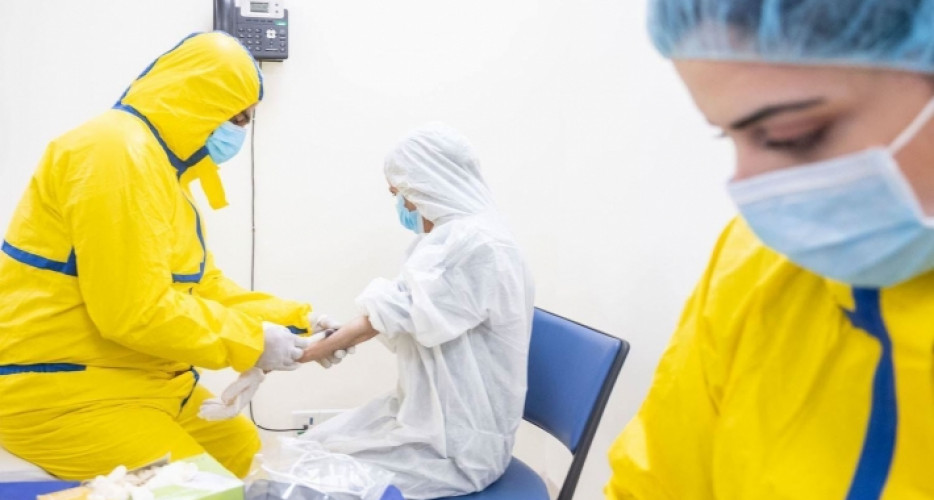
Peregraf- Ghamgin Mohamad
Awat Ahmed sits on a hospital chair, mask-less and coughing from time to time, waiting for the results of his coronavirus test. It does not take long for it to come back positive.
After receiving his result, the 23-year-old is instructed by doctors to quarantine at his home in Sulaymaniyah and only visit the hospital if his situation deteriorates.
Last autumn, hospitals in the Kurdistan Region were inundated with the hundreds of people who tested positive for coronavirus infection each day. At the time, medical officials did not have space for anyone except for the most serious cases, but now some facilities are empty.
Interviewed by PEREGRAF at Ali Naji Hospital in Sulaimaniyah, which is a dedicated facility for the treatment of patients infected with the novel coronavirus, Awat said he did not know where or how he contracted the virus.
The novel coronavirus, which causes a lung disease known as COVID-19, first appeared in late 2019 in China before arriving in Iraq in February and in March 2020. In response, officials in the Kurdistan Region implemented protective measures, including enforcing a curfew last spring.
At first, people were not only afraid of getting sick, but were ashamed to admit to their friends and neighbors that they had been infected for fear that they would be treated differently, which made it difficult to track the spread of the virus.
A year later, the measures implemented by medical authorities are less strict, although officials continue to warn that the pandemic will not be over anytime soon.
Nevertheless, Sarxel Azad, the manager of Ali Naji Hospital, told PEREGRAF that there has been an increase in the number of people getting tested compared with last month because of fears about a new coronavirus strain that originated in the UK and recently arrived in the Kurdistan Region and Iraq. Doctors say that it spreads much faster and is more dangerous that the original variant.
Aso Hawezy, Kurdistan Regional Government (KRG) health ministry spokesperson, told PEREGRAF that officials “need to use more rules at the border. People who arrive in the Kurdistan Region must get a COVID test.”
At its most recent meeting on February 22, the KRG’s Supreme Committee for Coronavirus Response announced several new protection measures, including imposing restrictions on travel between the Kurdistan Region and the rest of Iraq.
Iraq’s federal government has also tightened its response to the new coronavirus strains including by imposing a curfew intended to reduce the number of new infections and deaths.
COVID-19 patients in the Kurdistan Region are monitored at 11 hospitals and another 10 hospitals have been outfitted with specialized equipment in order to treat them, but there are few patients at the moment.
Hawezy said that “70 coronavirus patients are in hospital and a small number are in intensive care.”
Despite the decline in overall numbers, the virus still poses a serious danger, with the Ministry of Health continuing to issue warnings.
Sabah Hawrami, Sulaymaniyah governorate’s health director, told journalists on Feb 21st, that a new wave of coronavirus infections is expected to emerge early next month.
As with countries all over the world, Iraq is looking forward to receiving shipments of vaccines, a portion of which the government in Baghdad will distribute to the Kurdistan Region.
Hawezi said that doctors and health workers will be first to be vaccinated, followed by members of the security forces, the elderly, and those with chronic diseases. The government will then reevaluate and plan for further distribution.
The new coronavirus strain has put the health authorities on alert and the Kurdistan Parliament is monitoring the situation, looking for ways to improve the Region’s response to the pandemic.
Luqman Wardi, a member of the Health Committee in the Kurdistan Parliament, told to PEREGRAF that “the public health sector is in a bad situation and the ministry's monitoring of the private sector is very weak.”
“They have exploited the coronavirus situation for their own benefit,” he added.
For instance, not every person can get a nasal swab coronavirus test because at 60,000 Iraqi dinars ($41) it is too expensive for many people on limited incomes.
At border crossings, responsibility for testing has been given to private contractors, but the parliamentary health committee has suggested that responsibility should be returned to the ministry so that the price can be reduced.
Wardi said “the price of the coronavirus kit test is now low and if the test costs [people] 30,000 Iraqi dinars, the company still profits.”
The health ministry plans to increase its monitoring activities in order to prevent the spread of new strains of the virus, but are unsure about whether they are closer to returning to the situation before the pandemic or whether it will get worse and the Region is headed for another lockdown.
If that was told few months ago, he would have a lot of fear and anxiety, he couldn’t walk around the streets or go back to his home.
Instead I would add in may numbers comparing the situation in the Kurdistan Region in October and Janaury.